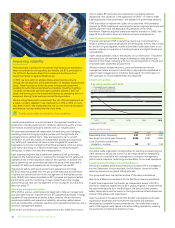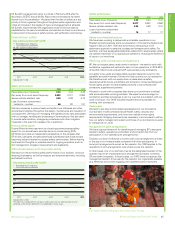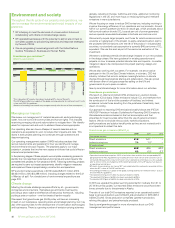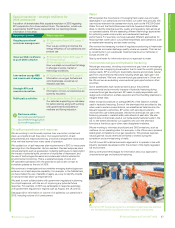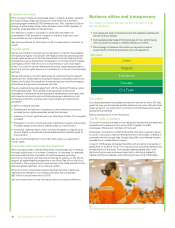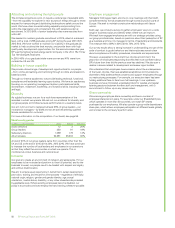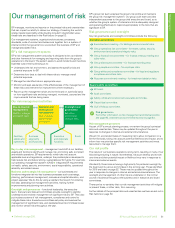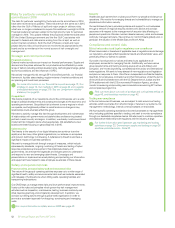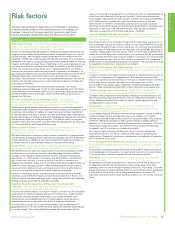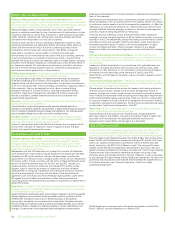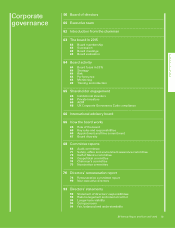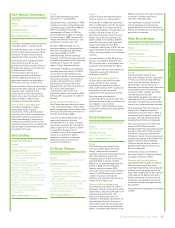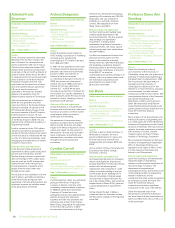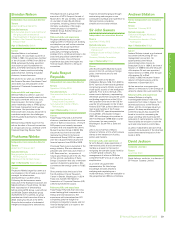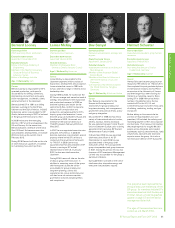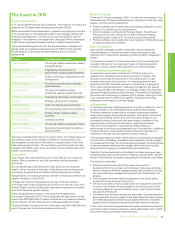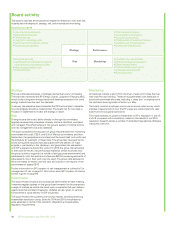BP 2015 Annual Report Download - page 58
Download and view the complete annual report
Please find page 58 of the 2015 BP annual report below. You can navigate through the pages in the report by either clicking on the pages listed below, or by using the keyword search tool below to find specific information within the annual report.
The Strategic report was approved by the board and signed on its behalf by
David J Jackson, company secretary on 4 March 2016.
Safety and operational risks
Process safety, personal safety, and environmental risks – we are
exposed to a wide range of health, safety, security and environmental risks
that could result in regulatory action, legal liability, increased costs, damage
to our reputation and potentially denial of our licence to operate.
Technical integrity failure, natural disasters, human error and other adverse
events or conditions could lead to loss of containment of hydrocarbons or other
hazardous materials, as well as fires, explosions or other personal and process
safety incidents, including when drilling wells, operating facilities and those
associated with transportation by road, sea or pipeline.
There can be no certainty that our operating management system or other
policies and procedures will adequately identify all process safety, personal
safety and environmental risks or that all our operating activities will be
conducted in conformance with these systems. See Safety on page 43.
Such events, including a marine incident, or inability to provide safe
environments for our workforce and the public while at our facilities, premises
or during transportation, could lead to injuries, loss of life or environmental
damage. We could as a result face regulatory action and legal liability, including
penalties and remediation obligations, increased costs and potentially denial of
our licence to operate. Our activities are sometimes conducted in hazardous,
remote or environmentally sensitive locations, where the consequences of
such events could be greater than in other locations.
Drilling and production – challenging operational environments and other
uncertainties can impact drilling and production activities.
Our activities require high levels of investment and are often conducted in
extremely challenging environments which heighten the risks of technical
integrity failure and the impact of natural disasters. The physical characteristics
of an oil or natural gas field, and cost of drilling, completing or operating wells is
often uncertain. We may be required to curtail, delay or cancel drilling
operations because of a variety of factors, including unexpected drilling
conditions, pressure or irregularities in geological formations, equipment
failures or accidents, adverse weather conditions and compliance with
governmental requirements.
Security – hostile acts against our staff and activities could cause harm to
people and disrupt our operations.
Acts of terrorism, piracy, sabotage and similar activities directed against our
operations and facilities, pipelines, transportation or digital infrastructure could cause
harm to people and severely disrupt business and operations. Our activities could
also be severely affected by conflict, civil strife or political unrest.
Product quality – supplying customers with off-specification products
could damage our reputation, lead to regulatory action and legal liability,
and potentially impact our financial performance.
Failure to meet product quality standards could cause harm to people and the
environment, damage our reputation, result in regulatory action and legal
liability, and impact financial performance.
Compliance and control risks
US government settlements – our settlements with legal and regulatory
bodies in the US announced in November 2012 in respect of certain
charges related to the Gulf of Mexico oil spill may expose us to further
penalties, liabilities and private litigation or could result in suspension or
debarment of certain BP entities.
Settlements with the US Department of Justice (DoJ) and the US Securities
and Exchange Commission (SEC) impose significant compliance and remedial
obligations on BP and its directors, officers and employees, including the
appointment of an ethics monitor, a process safety monitor and an independent
third-party auditor. Failure to comply with the terms of these settlements could
result in further enforcement action by the DoJ and the SEC, expose us to
severe penalties, financial or otherwise, and subject BP to further private
litigation, each of which could impact our operations and have a material
adverse effect on the group’s reputation and financial performance. Failure to
satisfy the requirements or comply with the terms of the administrative
agreement with the US Environmental Protection Agency (EPA), under which
BP agreed to a set of safety and operations, ethics and compliance and
corporate governance requirements, could result in suspension or debarment of
certain BP entities.
Regulation – changes in the regulatory and legislative environment could
increase the cost of compliance, affect our provisions and limit our access
to new exploration opportunities.
Governments that award exploration and production interests may impose specific
drilling obligations, environmental, health and safety controls, controls over the
development and decommissioning of a field and possibly, nationalization,
expropriation, cancellation or non-renewal of contract rights. Royalties and taxes
tend to be high compared with those of other commercial activities, and in certain
jurisdictions there is a degree of uncertainty relating to tax law interpretation and
changes. Governments may change their fiscal and regulatory frameworks in
response to public pressure on finances, resulting in increased amounts payable to
them or their agencies.
Such factors could increase the cost of compliance, reduce our profitability in
certain jurisdictions, limit our opportunities for new access, require us to divest
or write down certain assets or curtail or cease certain operations, or affect the
adequacy of our provisions for pensions, tax, decommissioning, environmental
and legal liabilities. Potential changes to pension or financial market regulation
could also impact funding requirements of the group.
Following the Gulf of Mexico oil spill, there have been cases of additional
oversight and more stringent regulation of BP and other companies’ oil and gas
activities in the US and elsewhere, particularly relating to environmental, health
and safety controls and oversight of drilling operations, which could result in
increased compliance costs. In addition, we may be subjected to a higher
number of citations and level of fines imposed in relation to any alleged
breaches of safety or environmental regulations, which could result in increased
costs.
Ethical misconduct and non-compliance – ethical misconduct or
breaches of applicable laws by our businesses or our employees could be
damaging to our reputation, and could result in litigation, regulatory action
and penalties.
Incidents of ethical misconduct or non-compliance with applicable laws and
regulations, including anti-bribery and corruption and anti-fraud laws, trade
restrictions or other sanctions, or non-compliance with the recommendations
of the ethics monitor appointed under the terms of the DoJ and EPA
settlements, could damage our reputation, result in litigation, regulatory action
and penalties.
Treasury and trading activities – ineffective oversight of treasury and
trading activities could lead to business disruption, financial loss, regulatory
intervention or damage to our reputation.
We are subject to operational risk around our treasury and trading activities in
financial and commodity markets, some of which are regulated. Failure to
process, manage and monitor a large number of complex transactions across
many markets and currencies while complying with all regulatory requirements
could hinder profitable trading opportunities. There is a risk that a single trader
or a group of traders could act outside of our delegations and controls, leading
to regulatory intervention and resulting in financial loss and potentially damaging
our reputation. See Financial statements – Note 28.
Reporting – failure to accurately report our data could lead to regulatory
action, legal liability and reputational damage.
External reporting of financial and non-financial data, including reserves
estimates, relies on the integrity of systems and people. Failure to report data
accurately and in compliance with applicable standards could result in
regulatory action, legal liability and damage to our reputation.
Gulf of Mexico oil spill
There continues to be uncertainty regarding the extent and timing of the
remaining costs and liabilities relating to the Gulf of Mexico oil spill not
covered by the proposed Consent Decree and the Settlement Agreement.
The proposed Consent Decree between the United States, the five Gulf Coast
states and BP and the Settlement Agreement between BP and the Gulf Coast
states will, subject to these becoming effective, settle all federal and state
claims arising from the 2010 Gulf of Mexico oil spill. The proposed Consent
Decree and the Settlement Agreement are conditional upon each other and
neither will become effective until there is final approval of the Consent Decree.
There continues to be uncertainty regarding the extent and timing of the
remaining costs and liabilities relating to the Gulf of Mexico oil spill not covered
by the proposed Consent Decree and the Settlement Agreement. For items not
covered by the proposed Consent Decree and the Settlement Agreement and
for further information, see Financial statements – Note 2 and Legal
proceedings (page 237).
BP Annual Report and Form 20-F 201554


